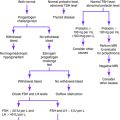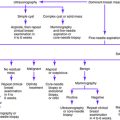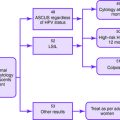Chapter 19 HYPERTENSION DURING PREGNANCY
Hypertension is defined as systolic blood pressure of 140 or higher, a diastolic blood pressure of 90 or higher, or both. Women with hypertension during pregnancy need to be monitored carefully because of the significant risk of morbidity and mortality in the mother, fetus, and newborn. Hypertension during pregnancy is classified as gestational hypertension, preeclampsia, eclampsia, or chronic hypertension.
Causes of Hypertension During Pregnancy
Key Historical Features
Key Physical Findings
✓ General evaluation for rapid weight gain or facial edema, because fluid retention is associated with preeclampsia
✓ Funduscopic examination for evidence of retinopathy in patients with chronic hypertension
✓ Cardiovascular examination for arrhythmias, heart murmurs, abnormal heart sounds, carotid or femoral bruits, and peripheral pulses
✓ Pulmonary examination for evidence of pulmonary edema
✓ Obstetric evaluation to determine fundal height for fetal growth
✓ Gastrointestinal examination for right upper quadrant tenderness, liver enlargement, or an enlarged kidney
Suggested Work-Up
| Urinalysis | To evaluate for proteinuria and glucosuria |
| Twenty-four-hour urine sampling for total protein or spot urine protein/creatinine ratio | To evaluate for and quantify proteinuria |
| Complete blood cell count | Because hemoconcentration occurs with preeclampsia and because hemolysis and thrombocytopenia may be associated with preeclampsia as part of the syndrome of hemolysis, elevated liver enzyme counts, and low platelet count (HELLP) |
| Serum creatinine measurement | Elevated creatinine levels may be associated with chronic kidney disease or preeclampsia |
| Uric acid measurement | Elevated uric acid level is associated with preeclampsia |
| Lactate dehydrogenase (LDH) measurement | Elevated LDH level may be a sign of hemolysis |
| Partial thromboplastin time (PTT), prothrombin time (PT), and international normalized ratio (INR) measurements | To evaluate for coagulopathy |
| Alanine transaminase (ALT) and aspartate transaminase (AST) measurements | Elevated liver enzyme levels are suggestive of severe preeclampsia |
Additional Work-Up
| Obstetric ultrasonography | Baseline ultrasonography should be performed at 18 to 20 weeks of pregnancy |
| According to the Working Group on High Blood Pressure in Pregnancy, ultrasonography for fetal growth and amniotic fluid should be repeated every 3 weeks in patients with mild preeclampsia if the sonograms are normal | |
| In patients with chronic hypertension, ultrasonography should be repeated only if there is a change in maternal or fetal condition or if fetal growth cannot be assessed through fundal height measurement (e.g., with maternal obesity) | |
| Nonstress test and biophysical profile | Both should be performed regularly to evaluate fetal well-being |
| Electrocardiography | To evaluate for evidence of left ventricular hypertrophy in patients with chronic hypertension |
| Echocardiography | May be considered in patients with chronic hypertension to evaluate for left ventricular hypertrophy |
ACOG Committee on Practice Bulletins. ACOG Practice Bulletin. Chronic hypertension in pregnancy. ACOG Committee on Practice Bulletins. Obstet Gynecol. 2001;98(1Suppl):177-185.
ACOG Committee on Practice Bulletins–Obstetrics. ACOG practice bulletin. Diagnosis and management of preeclampsia and eclampsia. Number 33, January 2002. Obstet Gynecol. 2002;99:159-167.
Beckmann CRB, Ling FW, Smith RP, et al. Hypertension in Pregnacy. In Obstetrics and Gynecology, 5th, Philadelphia: Lippincott Williams & Wilkins; 2006:188-196.
Report of the National High Blood Pressure Education Program Working Group on High Blood Pressure in Pregnancy. Am J Obstet Gynecol. 2000;183(1):S1-S22.
The Seventh Report of the Joint National Committee on the Prevention, Detection, Evaluation and Treatment of High Blood Pressure. Washington, DC: U.S. Department of Human and Health Services, December 2003
Wagner LK. Diagnosis and management of preeclampsia. Am Fam Physician. 2004;70:2317-2324.
Zamorski MA, Green LA. NHBPEP report on high blood pressure in pregnancy: a summary for family physicians. Am Fam Physician. 2001;64:263-270.





